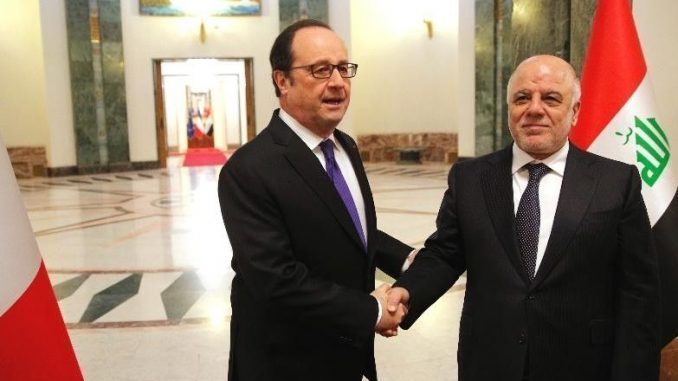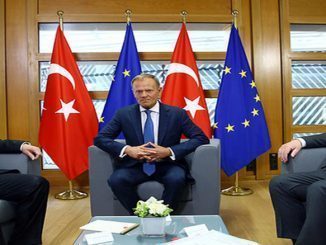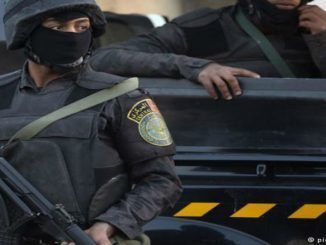
French president Francois Hollande visited Iraq on January 2, to visit the French soldiers fighting alongside coalition forces in Iraq and talk about the danger of terrorism.
Hollande, who was traveling with French defense minister Jean-Yves Le Drian, had already visited in 2014 and remains the most prominent head of state to come to Iraq since the launch, two and half years ago, of a US-led coalition against the armed groups.
This visit came hours after his New Year address to the French people, in which he said: “We’re not done with the plight of terrorism. We have to keep on fighting it.”
Hollande’s visit was aimed at concentrating on France’s fight against terrorism and the importance of defeating ISIS in Iraq after a series of terror attack have targeted France during 2016.
“We have a common enemy: it’s terrorism, it’s Daesh, it’s fundamentalism. This enemy, we need to hunt it down in places where it exists – in Iraq, in Syria. But also we need to understand the links which exist between these terrorist groups and a certain number of individuals who are manipulated and who organize attacks in several countries.”
France has around 500 troops fighting alongside coalition forces in Iraq, backed by Rafale fighter jets.
France’s defense ministry says its aircraft have destroyed more than 1,700 targets since joining in 2014.
French special forces are believed to be involved in the battle to drive ISIS militants out of Mosul, the group’s last major stronghold in Iraq.
That offensive began in October and forces launched a fresh push within the last week. They said they had opened new fronts in the city.
“Taking action against terrorism here in Iraq is also preventing acts of terrorism on our own soil,” Hollande said at a base of Iraq’s elite Counter-Terrorism Service near Baghdad.
When he was asked what to do after ISIS’s defeat, saying he would “stress the importance of continuing efforts to ensure sustainable security in the country after Daesh (IS) has been defeated and the coexistence of communities in a united and sovereign Iraq”.
Hunting French fighters with ISIS
Speaking about the French citizens fighting with ISIS, Hollande said that “France will fight any French jihadists it finds on the battlefields of Iraq, arrest them if they return home and work to de-radicalize their children.”
There are about 60 French citizens fighting alongside Islamic State militants in the northern city of Mosul alone and hundreds more in the rest of the country and Syria, French diplomatic sources said.
“We will fight them like (we fight) all jihadists … since they are attacking us, since they prepare attacks on our own territory,” Hollande told a news conference.
The children of returning militants would be taken in and “de-radicalised,” he said on the one-day visit. “We are preparing for these returns and the very particular processing of these children.”
Following the attacks by Islamic extremists in Paris in 2015, the French government decided to increase its defense budget by €600m (£506m) in 2016 and €700m this year.
Hollande’s presidency and the fight against terrorism
Hollande supported the foreign engagements undertaken by France during his presidency.
In Iraq, the country is the second largest contributor to the international coalition after the United States.
Under Operation Chammal, which began in September 2014, France has deployed one aircraft carrier, two frigates, 18 fighter jets, six bombers and other major assets. Almost 1,000 French troops are involved in the mission. France has conducted some 12% of the non-US airstrikes.
From an early stage, his personal engagement in the campaign was evident. The first French airstrikes happened within days of a visit to Iraq in September 2014. At that point France was not committed to joining the Western effort in Syria, but that was to change the following year.
Prior to the Middle East operation, in January 2013, Hollande had sent troops to spearhead a counter-terrorism drive in Mali. France led an international coalition which became Operation Sangaris and lasted two years.



